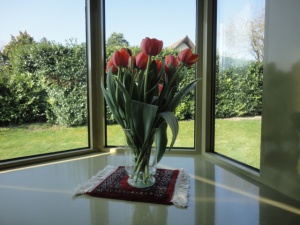True, Muriel wrote, “Please just come with empty hands”.
I did read this in the invitation for tea at her home. Then I immediately started thinking of a nice gift that would please Muriel.
On the day of the tea, I brought her a bouquet of tulips grown in a farm house near my home. I like them as they are always cut in the morning and full of fresh energy. It was my pleasure to bring the tulips to thank to her.
The tea started with a warm welcome by Muriel and her husband, Ted. They were happy with the tulips and I was happy to see them happy.
When Muriel left to the kitchen, Ted whispered to me, “Yoshiko, when we say, ‘Please come with empty hands’, it is the warmest expression of welcoming friends. We mean it. ”
I was almost startled!
I’ have realized that what I did goes against their kindness!
Muriel and Ted were kind and open-minded to understand my thankfulness. We enjoyed the tea and an apple pie baked by Ted in a sunny salon.
Three days later, I received from Muriel and Ted a photograph of the tulips happily placed in their sunny living room.

Lesson 1
I interpreted “Please just come with empty hands” in a Japanese way. In Japan, you are uncivilized if you go to your friend’s home without anything, even though your friend may say so in her/his invitation. In Japanese culture, always think what it is meant by words.
Lesson 2
It is safe and would even please your Japanese friends to bring some small gift, when you are invited. They may tell you beforehand, “Please just come with empty hands”. Do not take it as the words say. Words need to be understood in the Japanese cultural context. They may not expect a nice gift, but it is safe and even better to bring some small gift to express your thankfulness.
